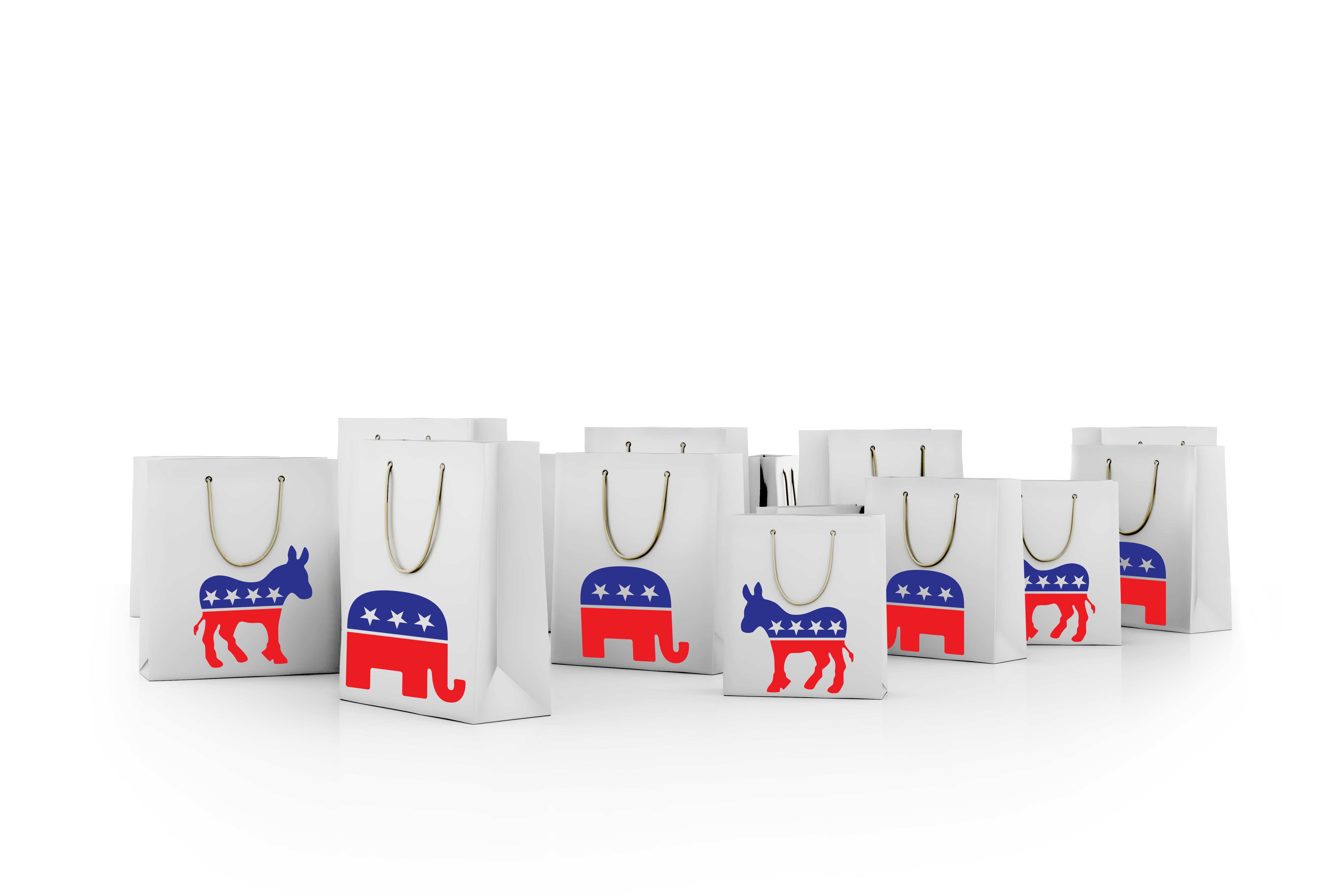How I learned to stop worrying and love the politicization of shopping
This is the real lesson of L'affair Nordstrom


A free daily email with the biggest news stories of the day – and the best features from TheWeek.com
You are now subscribed
Your newsletter sign-up was successful
Call it the reductio ad Baio — that moment when the politicization of consumer goods, or retail tribalism, reaches a new low of absurdity.
It happens like this: Nordstrom declares it's dropping presidential daughter Ivanka Trump's product line. The president tweets against Nordstrom in high dudgeon. "Many women nationwide" (according to Breitbart News', ahem, unscientific estimate) cut up their Nordstrom cards in protest of the luxury retailer's decision. And Charles in Charge actor Scott Baio declares that he will "NEVER AGAIN!" shop at Nordstrom.
L'affair Nordstrom is illustrative of a broader trend: From the TV shows we watch to where we choose to buy groceries, from fast-food chains to arts-and-crafts supply stores, there is seemingly no area of American life that is uninfected by political polarization.
The Week
Escape your echo chamber. Get the facts behind the news, plus analysis from multiple perspectives.

Sign up for The Week's Free Newsletters
From our morning news briefing to a weekly Good News Newsletter, get the best of The Week delivered directly to your inbox.
From our morning news briefing to a weekly Good News Newsletter, get the best of The Week delivered directly to your inbox.
And that's a good thing.
America is a land of ever-more-customized content, goods, and services. The late Russian leader Boris Yeltsin recognized this on a trip to a grocery store near Houston in 1989. "Their supermarkets have 30,000 food items," he said. "You can't imagine it. It makes people feel more secure."
Americans have so much to choose from! And it's inevitable that when faced with such variety, Americans are bound to make consumer choices that comport with their values. Indeed, Harvard Business School's Michael Norton told The Atlantic that politically motivated boycotts often depend on the existence of such choices: "There's some research that shows that one of the key predictors of boycotts is actually the availability of substitutes. … It's as though you will strongly express your political opinions as long as there is a comparable brand that you can buy instead."
Boycotting isn't a zero-sum game of consumer hardball; it's a harmless expression of identity. We talk a big game of outrage, but we're not exactly depriving ourselves of anything when we engage in political boycotting. In fact, the term "boycott," evoking as it does the refusal to buy something, should probably be retired. Because of the choices available to us, Americans today often make affirmative choices with our wallets and eyeballs.
A free daily email with the biggest news stories of the day – and the best features from TheWeek.com
Consider the emergence of Chic-fil-A as a distinctly Christian fast-food alternative in the Obama era. But no one is giving up much of anything by boycotting Chic-fil-A. We're all familiar with those highway signs pointing to the assortment of lodging and restaurant options no more than a mile-and-a-half up the road. If you're opposed to same-sex marriage and enjoy the soothing sounds of instrumental praise-and-worship music, Chic-fil-A is your best bet. If not, then there's McDonald's, Wendy's, Burger King, Arby's, KFC, and on and on and on..
There is emotional satisfaction to be derived in eating at Chic-fil-A — as well as in driving past Chic-fil-A and saying, "I refuse to support them with my business." But let's not be fooled: If you're in the latter group, you're really not giving up anything.
So what do we even mean when we say we'd like to return to the halcyon days before everything became so damn politicized? Effectively, we mean the 1950s, when homogeneity reigned. As the economists Brad DeLong and Stephen S. Cohen write of Eisenhower-era America:
For breakfast, they all had — along with the same milk, break, and butter — a large variety of cereal in boxes, all coming from the same three or four companies. They all washed their hands and faces with Lux or Palmolive or Ivory, and brushed their teeth with toothpaste from the same three companies (Procter & Gamble, Unilever, and Colgate-Palmolive). Their refrigerators and washers and dryers were differentiated in only the small details. By and large, everyone also saw the same movies and heard the same music. … Overwhelmingly, they sent their kids to the public school, a powerful drive for neighborhood separation and homogenization. And of course, the rich man's Cadillac had many features to signal that it was better and certainly more expensive than the plainer man's Chevrolet, but they shared about 85 percent of the same parts. [Concrete Economy]
We cannot return to that era. And the truth is, few of us want to.
Now, I recognize that emotions are running hot. The lines of polarization are hardening. One half of the country can't stand the other half. It's to the point where we're taking out ads for roommates in which support for Trump is considered a dealbreaker. Quite literally, we can't live with each other. But that's the adaptive genius of modern-day America. It's the consumer equivalent of the federalist experiment, where provincial and territorial variety is considered a feature rather than a bug: We don't have to shop together. We don't have to eat together. We don't have to live together.
Pluralism is hard. We have in the Trump administration a cadre of men who seem bent on making it harder. But I would submit that our ability to withdraw from one another is, paradoxically, one of the essential ways in which we're going to make it through all this in one multifarious piece.
Scott Galupo is a freelance writer living in Virginia. In addition to The Week, he blogs for U.S. News and reviews live music for The Washington Post. He was formerly a senior contributor to the American Conservative and staff writer for The Washington Times. He was also an aide to Rep. John Boehner. He lives with his wife and two children and writes about politics to support his guitar habit.
-
 Film reviews: ‘Send Help’ and ‘Private Life’
Film reviews: ‘Send Help’ and ‘Private Life’Feature An office doormat is stranded alone with her awful boss and a frazzled therapist turns amateur murder investigator
-
 Movies to watch in February
Movies to watch in Februarythe week recommends Time travelers, multiverse hoppers and an Iraqi parable highlight this month’s offerings during the depths of winter
-
 ICE’s facial scanning is the tip of the surveillance iceberg
ICE’s facial scanning is the tip of the surveillance icebergIN THE SPOTLIGHT Federal troops are increasingly turning to high-tech tracking tools that push the boundaries of personal privacy
-
 The billionaires’ wealth tax: a catastrophe for California?
The billionaires’ wealth tax: a catastrophe for California?Talking Point Peter Thiel and Larry Page preparing to change state residency
-
 Bari Weiss’ ‘60 Minutes’ scandal is about more than one report
Bari Weiss’ ‘60 Minutes’ scandal is about more than one reportIN THE SPOTLIGHT By blocking an approved segment on a controversial prison holding US deportees in El Salvador, the editor-in-chief of CBS News has become the main story
-
 Has Zohran Mamdani shown the Democrats how to win again?
Has Zohran Mamdani shown the Democrats how to win again?Today’s Big Question New York City mayoral election touted as victory for left-wing populists but moderate centrist wins elsewhere present more complex path for Democratic Party
-
 Millions turn out for anti-Trump ‘No Kings’ rallies
Millions turn out for anti-Trump ‘No Kings’ ralliesSpeed Read An estimated 7 million people participated, 2 million more than at the first ‘No Kings’ protest in June
-
 Ghislaine Maxwell: angling for a Trump pardon
Ghislaine Maxwell: angling for a Trump pardonTalking Point Convicted sex trafficker's testimony could shed new light on president's links to Jeffrey Epstein
-
 The last words and final moments of 40 presidents
The last words and final moments of 40 presidentsThe Explainer Some are eloquent quotes worthy of the holders of the highest office in the nation, and others... aren't
-
 The JFK files: the truth at last?
The JFK files: the truth at last?In The Spotlight More than 64,000 previously classified documents relating the 1963 assassination of John F. Kennedy have been released by the Trump administration
-
 'Seriously, not literally': how should the world take Donald Trump?
'Seriously, not literally': how should the world take Donald Trump?Today's big question White House rhetoric and reality look likely to become increasingly blurred
